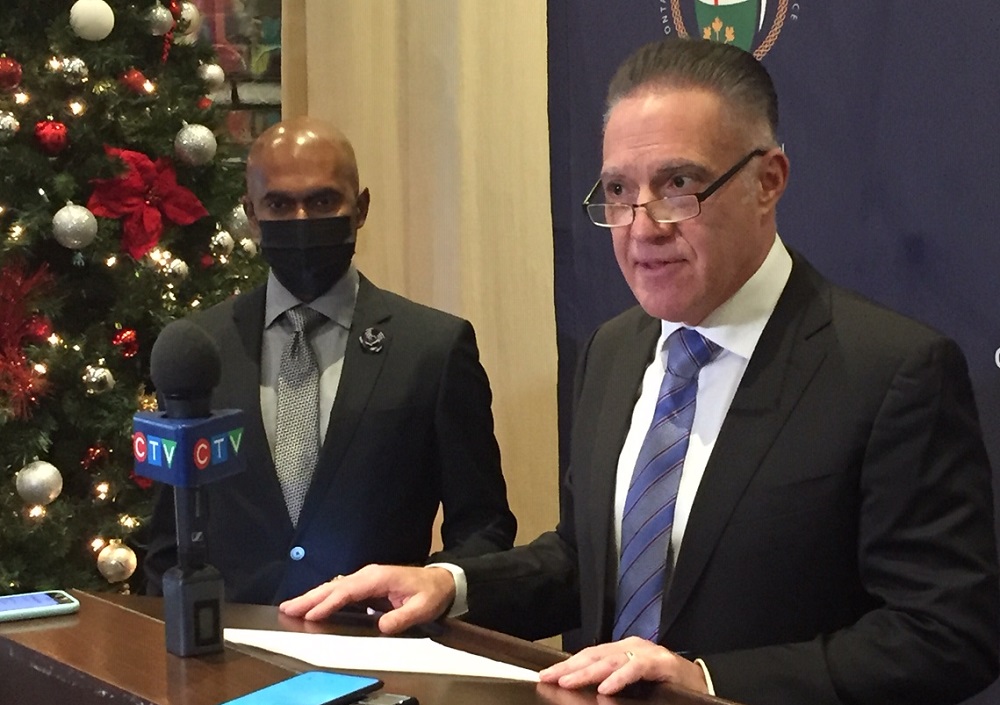
Public safety issues and challenges facing frontline officers were at the forefront of discussions as Ontario’s chiefs of police met in Chatham this week.
The Board of Directors of the Ontario Association of Chiefs of Police met in Chatham on Monday, for a two-day meeting at the Retro Suites. The board discussed a number of topics relating to difficulties and challenges facing police services across the province, and contemporary policing issues that have a direct impact on Ontario and local communities.
“Coming out of the last several years, we have not seen the immense pressures on policing like we’ve done. Not just with the health pandemic but, certainly, everything geopolitical has had a transformational impact on policing,” said Peel Regional Police Chief and OACP First Vice President Nishan Duraiappah.
With the advancement in technology and a greater demand for accountability, many larger police services have implemented policies that have frontline officers wearing body cameras. Many small and mid-sized are moving in that direction as well, according to Chatham-Kent Police Service Chief Gary Conn.
Conn, who is also the president of the OACP, said CKPS has addressed body cams in its strategic plan for 2021-2024, and the municipality could see a pilot project launched before the end of 2022.
“So obviously I’m very interested in the discussions we’re going to have here for the next couple of days in regards to body-worn cameras,” Conn said on the first day of the OACP meeting.
He added that the CKPS hopes to have a full rollout of body-worn cameras for all frontline officers in the first half of 2023.
Conn said the initiative is still early in the planning process. The CKPS will likely have to refer to other police services that already utilize body cameras when developing a business case, Conn said, which will help determine the cost of implementation locally.
“We want to ensure there are consistencies as we develop our policies and procedures in regard to body-worn cameras, as well as best practices,” he said.
As the province, along with the rest of the world, continues to contend with the pandemic, Ontario’s police services have had to frequently adapt to changes in policing. During the meeting, the board of directors addressed the impact the pandemic has had on police resources and budgets, as well as the health and safety of police personnel.
“Having gone through the last two years of COVID-19, we’ve been able to develop best practices which we share throughout the province,” said Conn.
He added that there is a “repository” of those best practices on the OACP website that can be referred to by all Ontario police services.
“[This facilitates] some consistency right across the province in respect to ensuring the policies and procedures are the same from one service to the other, while still keeping in mind that they are going to change. And we rely on our health specialists to assist us in that regard,” said Conn.
The pandemic has also created its fair share of mental health issues, which was another topic addressed during the OACP meeting.
“[The pandemic] has certainly provided an additional element of challenges,” Conn said. “I know locally here, we’ve seen our numbers increase and I think that is the trend right across the province. More people are suffering from mental health, as well as complex social disorders.”
Conn said the circumstances of mental health calls can be wide-ranging, and can also involve individuals suffering from addiction, homelessness and poverty.
Locally, Conn said the CKPS has plans to expand its mobile crisis team. Currently, the local police service has one frontline officer with specific training for responding to calls involving individuals with mental health issues. That officer is also partnered with a psychiatric crisis nurse.
Conn said the mobile crisis team will be expanded to include an additional trained mental health officer and a second psychiatric crisis nurse.
“We’re starting to see that trend right across the province. Obviously, complex social disorders are not something that is unique to just here in Chatham-Kent,” he said.
Conn added that other regions across Ontario will likely see an expansion of mobile crisis units within their local police services.
Before the two-day meeting ends on Tuesday, the board of directors will be discussing several other topics that affect policing in Ontario, including gender equity, addressing systematic racism, and working with the provincial government on the new Ontario Police Services Act.





